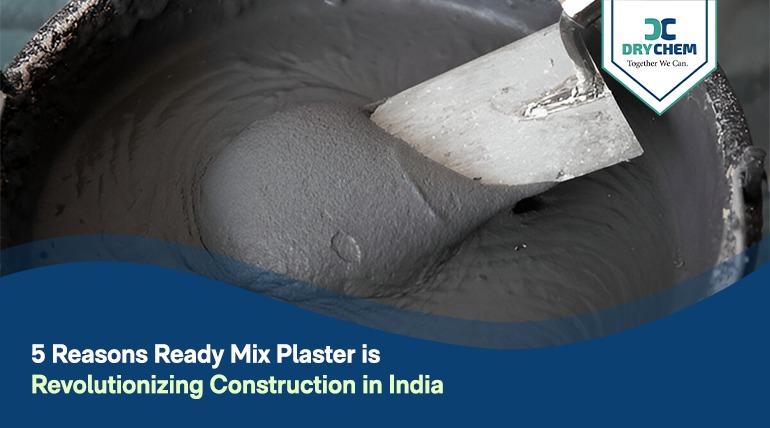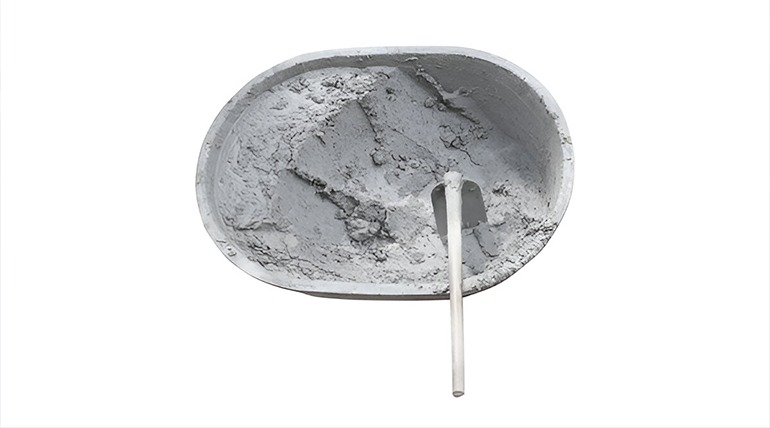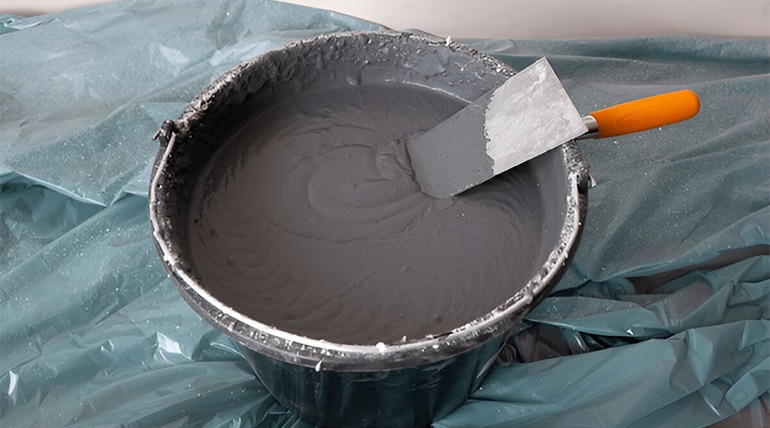
In the dynamic landscape of Indian construction, a quiet revolution is underway—one that is steadily replacing traditional methods with a more efficient, consistent, and sustainable alternative: Ready Mix Plaster (RMP). For too long, arranging and stacking raw materials, screening sand, and the repeated shifting and measuring involved in on-site plaster mixing have been the norm—a practice riddled with inefficiencies, inconsistencies, and significant material wastage. However, with growing demands for faster project completion, superior finish quality, and improved cost-effectiveness, RMP is emerging as an undeniable game changer.
Let’s delve into five compelling reasons why Ready Mix Plaster is not just an option, but a necessity, for the future of Indian construction.
1. Unwavering Consistency: The Hallmark of Quality
One of the biggest headaches in traditional plastering is achieving uniform quality across an entire project. Manual mixing, with its inherent variability and inconsistencies in sand, cement, and water ratios, often leads to inconsistent plaster strength, finish, and drying times. This can result in a patchy appearance, differential shrinkage cracks, and a compromise in the overall durability of the structure.
Ready Mix Plaster, on the other hand, is manufactured in state-of-the-art facilities under strict quality control. The ingredients—typically graded sand, Portland cement, and specially formulated additives—are precisely weighed and blended using automated processes. This meticulous control ensures:
- Homogeneous Mix: Machine-mixed material ensures every batch of RMP is identical, guaranteeing consistent workability, setting time, and strength.
- Predictable Performance: Contractors can rely on RMP to perform uniformly, eliminating surprises and rework.
- Superior Finish: The appropriate grading of sand and precise additive dosage in RMP often result in a smoother, more aesthetically pleasing finish, reducing the need for extensive putties and primers.
This consistent quality is paramount for Indian builders aiming for high-rise residential projects, commercial complexes, and infrastructure developments, where quality assurance is non-negotiable.
2. Significant Waste Reduction: A Step Towards Sustainable Building
The piles of wasted sand and cement at construction sites are a familiar sight across India. Traditional on-site mixing is notoriously inefficient, with wastage due to sand screening, material spillage, over-mixing, and inaccurate proportions contributing to substantial losses. In a country where resource optimisation is becoming increasingly critical, this wastage is simply unsustainable.
Ready Mix Plaster significantly mitigates this problem:
- Zero Sand Screening Wastage: The hassle of sand screening and the associated manpower is reduced, and wastage is minimised.
- Minimised Spillage: RMP arrives pre-mixed in bags, eliminating the need for open storage and manual handling of raw materials, thereby reducing spillage.
- Accurate Proportions, Less Rework: Since the mix is prepared using automated machines, there’s no risk of proportion errors. This reduces the need for rework, unlike traditional methods that often require removal and re-application due to inconsistent mixes.
- Optimised Resource Utilisation: Manufacturing RMP in controlled environments ensures efficient use of raw materials, minimising excess inventory and enabling the reuse of discarded batches in further production.
By embracing RMP, Indian construction companies are not only saving on material costs but also contributing to a greener building ecosystem, aligning with the nation’s growing focus on sustainable development.

3. Accelerated Project Timelines: The Need for Speed
In the fast-paced Indian construction market, time is quite literally money. Delays in plastering can have a cascading effect, pushing back subsequent activities like painting, flooring, and interior finishing. Traditional plastering is a labour-intensive process, dependent on the availability and skill of masons, and often slowed down by the cumbersome process of on-site material preparation.
Ready Mix Plaster offers a distinct advantage in terms of speed:
- Ready-to-Use: RMP eliminates the time-consuming steps of measuring, mixing, and sieving raw materials on site. It arrives ready to be applied, allowing work to commence immediately.
- Faster Application: The consistent workability of RMP often allows for quicker and smoother application, especially when using plastering machines, which are becoming more prevalent in larger projects.
- Reduced Curing Time (in some variants): Certain RMP formulations are designed for faster setting and curing, further compressing project schedules. This is particularly beneficial in projects with tight deadlines, common in India’s booming real estate sector.
For developers striving to deliver projects ahead of schedule and maximise returns, the efficiency offered by RMP is a significant competitive edge.
4. Cost-Effectiveness: Beyond the Price Tag
While the per-bag cost of Ready Mix Plaster may appear slightly higher than that of individual raw materials, a holistic cost analysis reveals significant long-term savings for Indian projects:
- Priceless Time: Ready-to-use bags save overall project time—an invaluable benefit for all stakeholders.
- Reduced Labour Costs: The simplified application process and faster turnaround require fewer labourers and lead to quicker completion, directly lowering labour expenses.
- Lower Material Wastage: As discussed earlier, the significant reduction in material waste results in tangible cost savings.
- Minimised Storage Requirements: The elimination of bulk on-site storage for sand and cement frees up valuable space and cuts down on associated logistics costs.
- Reduced Supervision: The consistent quality of RMP reduces the need for constant monitoring and quality checks, saving managerial time and effort.
- Avoidance of Rework: By ensuring uniform quality, RMP lowers the risk of plaster defects that typically lead to costly repairs or reapplication.
When all these factors are considered, RMP often proves to be the more economical option, especially for large-scale projects where these efficiencies are multiplied.
5. Enhanced Site Management and Safety: A More Organised Approach
Traditional plastering sites often present a chaotic picture: mounds of sand, scattered cement bags, and water drums, all contributing to a less organised and potentially hazardous environment.
Ready Mix Plaster contributes to a more streamlined and safer construction site:
- Cleanliness and Organisation: RMP bags are neatly stacked, reducing clutter and improving overall site aesthetics.
- Reduced Dust and Pollution: On-site mixing generates significant dust and airborne particles. RMP, being pre-mixed, drastically reduces this, leading to a healthier working environment for labourers and less environmental pollution, a growing concern in Indian cities.
- Improved Safety: Less manual handling of heavy bags of cement and sand, and reduced presence of loose materials, translates to fewer slips, trips, and other site accidents.
For project managers in India, the improved site management and enhanced safety aspects offered by RMP are invaluable, contributing to smoother operations and better adherence to safety regulations.

The Indian Context: A Paradigm Shift with Drychem
The adoption of Ready Mix Plaster in India is not merely a trend; it’s a strategic shift driven by evolving demands. With the “Housing for All” mission, “Smart Cities” initiatives, and rapid infrastructure development, the Indian construction sector is under immense pressure to deliver high-quality structures quickly and efficiently. RMP directly addresses these needs.
Drychem stands out as a leading brand actively contributing to this revolution in India. Their commitment to research, quality control, and manufacturing excellence ensures that their Ready Mix Plaster solutions meet the stringent requirements of modern Indian construction. Drychem’s presence across the country further solidifies the widespread acceptance of high-quality RMP in the Indian market. Major Indian construction companies and developers are increasingly integrating RMP into their projects, from high-rise residential complexes to large-scale commercial developments, showcasing its undeniable benefits.
Conclusion:
Ready Mix Plaster is more than just a convenience; it’s a fundamental change in how plastering is done. Its benefits – unwavering consistency, significant waste reduction, accelerated project timelines, overall cost-effectiveness, and enhanced site management – are revolutionising construction practices in India, paving the way for a future that is more efficient, sustainable, and built to last. For any builder or developer looking to stay ahead in the competitive Indian market, embracing Ready Mix Plaster, especially from trusted brands like Drychem, is no longer an option, but a strategic imperative.
